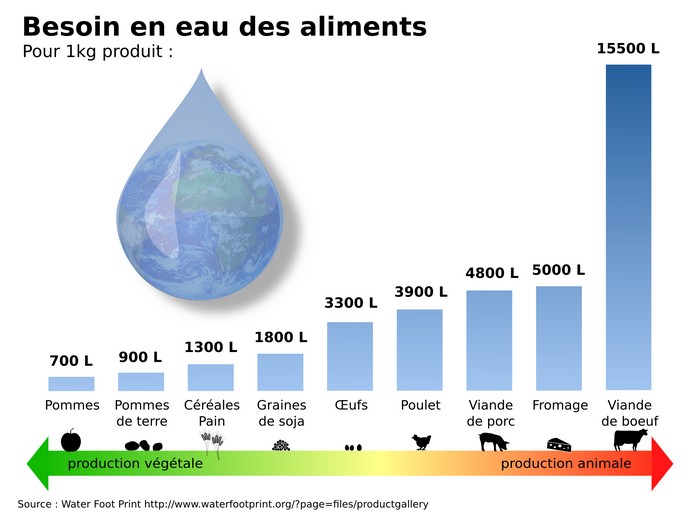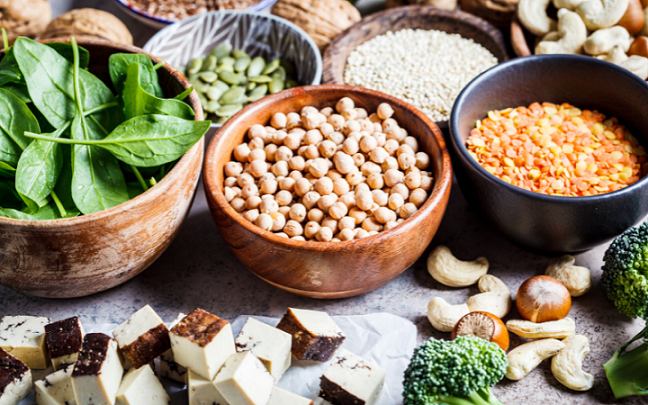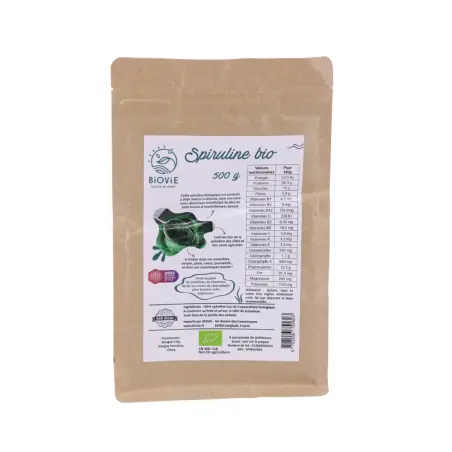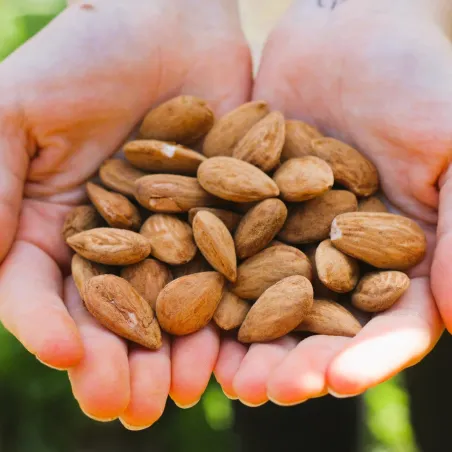In a world where health and sustainability are at the heart of concerns, the plant proteins emerge as a promising alternative to animal proteins. Long considered inferior in terms of assimilability, recent research (see references at the bottom of the article) reveals that plant proteins can not only compete with their animal counterparts, but they also offer significant ecological and health benefits, thereby contributing to prevent a protein deficiency. .
Indeed, a diet rich in diverse plant-based proteins can provide all the essential amino acids necessary for the body, thereby reducing the risk of protein deficiency and promoting better overall health.
A myth to debunk: The assimilation of plant proteins
Historically, plant-based proteins have been perceived as less assimilable than animal-based proteins. This idea is based on amino acid composition and digestibility. However, recent studies show that when consumed as part of a varied and balanced diet, plant-based proteins provide high nutritional quality, including all essential amino acids, and are well assimilated by the body.
People often talk about the combination of legumes and cereals, which provides a perfect amino acid profile.
The nutritional benefits of plant-based proteins
Plant proteins, found in legumes, cereals, nuts, and seeds, offer much more than just protein consumption. They are also rich in fiber, vitamins, and minerals, contributing to better digestive health and blood sugar regulation. The antioxidants and unsaturated fats they contain help reduce the risk of chronic diseases.
Impact on health and the environment
One of the major advantages of plant-based proteins lies in their low environmental impact. The production of plant protein requires less land, water, and generates fewer greenhouse gases compared to animal farming.

In terms of health, they are associated with a reduction in metabolic waste, which decreases the burden on the digestive and renal systems.
Integration of plant-based proteins into daily diet
Incorporating plant-based proteins into your daily diet is simple and beneficial. Foods such as lentils, chickpeas, quinoa, Tofu and almonds can easily replace animal protein sources in many dishes, while still providing essential energy intake.
Moreover, food innovation has led to the creation of plant-based meat substitutes that mimic texture and taste, making the transition even more accessible.
Different types of plant-based proteins:
Here are some of the most common types of plant-based proteins:
Soy It is one of the most complete sources of plant-based proteins. It is rich in essential amino acids and is used to make a variety of soy-based products such as tofu, tempeh, soy milk, miso, and soy juice, although the latter is less concentrated in protein compared to other soy-based products.
Wheat Wheat protein is often used in bakery products and pasta. It is also known as wheat gluten. It is used to make seitan, a plant-based meat substitute.
Legumes Peas, lentils, beans (such as: black beans, red beans, pinto beans or mung beans) are all rich in protein and form an important basis for a plant-based diet.
Quinoa Quinoa is a complete grain that contains all essential amino acids, making it an excellent source of protein for a vegan and vegetarian diet.
- Hemp "The" hemp seeds They are rich in proteins and omega-3 and omega-6 fatty acids. They can be consumed in the form of whole seeds, protein powder, or hemp milk.
- Rice Brown rice, in particular, contains decent amounts of protein. Brown rice is often consumed as a source of carbohydrates but also contains protein.
- Spirulina Spirulina is a microalga that is very rich in proteins. It is often consumed in the form of powder or tablets due to its high nutrient content.
- Nuts and seeds Almonds, cashews, pumpkin seeds, sunflower seeds, and other nuts and seeds also contain a fairly significant amount of protein.
These types of plant proteins can be used individually or combined in diets to ensure an adequate intake of proteins and essential amino acids.
Animal proteins vs. plant proteins:
Animal proteins:
Amino acid complex Animal proteins provide a complete set of essential amino acids, which means they contain all the amino acids necessary for the human body in adequate amounts.
High bioavailability Animal proteins have very good bioavailability, which means they are more easily absorbed and utilized by the body.
Rich in vitamins and minerals Animal proteins, particularly lean meats, fish, and dairy products, contain significant amounts of vitamin B12, iron, zinc, and other essential micronutrients.
Cholesterol and saturated fats Some sources of animal protein, such as fatty meats and high-fat dairy products, can contain high levels of cholesterol and saturated fats, which can be harmful to cardiovascular health when consumed in large quantities.
Plant proteins:
Variety of amino acids : Plant proteins can provide a wide range of amino acids, but some sources may be deficient in one or more essential amino acids. However, by combining different plant sources, it is possible to achieve a complete amino acid profile.
Low in saturated fat and cholesterol Plant-based proteins are naturally low in saturated fats and contain no cholesterol, making them a healthier choice for cardiovascular health.
Rich in fiber and phytonutrients Sources of plant-based proteins, such as legumes, whole grains, nuts, and seeds, are often rich in dietary fiber, antioxidants, and other phytonutrients beneficial for health.
Less environmental contamination Plant-based proteins are generally less likely to contain environmental contaminants such as heavy metals or antibiotics, which can sometimes be present in animal sources.
In conclusion, although animal proteins can offer a complete amino acid profile and better bioavailability, plant proteins present several advantages in terms of cardiovascular health, reducing the risks of chronic diseases, and having a lower environmental impact. It is therefore recommended to incorporate plant proteins into one's diet to promote long-term health and combat the adverse effects of climate change.
Plant proteins in raw food: An underrated nutritional asset
Raw food, which emphasizes the consumption of uncooked or minimally processed foods, offers a unique perspective on plant-based proteins. In this context, the sprouted seeds, Nuts, soaked and sprouted legumes, as well as certain algae, are prime sources of protein. These raw foods not only retain their full protein content but also a broader range of essential nutrients, such as enzymes, vitamins, and minerals, which are often altered by cooking.
Furthermore, a raw diet facilitates the assimilation and digestion of plant proteins, making their amino acids more available to the body. Adopting plant proteins in a raw diet can therefore contribute to better overall health, while offering a rich and diverse culinary experience.
This approach also aligns with the principles of sustainability and environmental respect, strengthening the argument in favor of a plant-based diet.
Conclusion: Towards Healthier and More Sustainable Eating
Plant-based proteins are not just an alternative to animal proteins; they represent a nutritious, ecological, and sustainable choice. By recognizing their value and wisely incorporating them into our diet, we can reap their numerous health benefits while contributing to the protection of our environment. This new understanding challenges the preconceived notions about the exclusive superiority of animal proteins, demonstrating that plant-based proteins are a viable and beneficial nutritional option in many respects.
Hacène FRIH
Bibliographic references
Guéguen, J., Walrand, S., & Bourgeois, O. (2016). Plant Proteins: Context and Potentials in Human Nutrition. Clinical Nutrition and Metabolism, 51, It seems like the text you provided is a range of numbers, "177-185." If you have a specific text in French that you would like translated to English, please provide that text, and I'll be happy to help!
Sure, please provide the text you would like to be translated from French to English., D.J., & Duc, G. (2001). The pea seed, a promising source of protein: Plant proteins and human nutrition. Ocl-Oilseeds and Fats, Lipids, 6, 518-523.
Mariotti, F., & Tomé, D. (1999). The nutritional properties of plant proteins in human nutrition: Plant proteins and human nutrition. Ocl-Oilseeds and Fats, Lipids, 6, 487-493.
Ligne, T. (1998). Enzymatic production and characterization of oligopeptides. Application to the hydrolysis of plant proteins to obtain a product of nutritional interest for animal feed.
Padilla, M. (1999). Evolution of the role of plant proteins in the diet of populations in economically less developed countries: Plant proteins and human nutrition. Ocl-Oilseeds and Fats, Lipids, 6, 482-486.















